Mississippi Sen. Trent Lott's praise for Strom Thurmond's 1948 presidential candidacy has unleashed a furor that has damaged the incoming Senate majority leader's credibility and may yet deliver a serious blow to his political career. The intensity of the reaction to Lott's comments prompts a look back at the 1948 election itself and the prevailing public opinion climate of the time, to see how social mores have changed in the past half-century.
Thurmond's campaign was itself born out of support for segregationist policy. He and a number of other prominent Southern Democrats walked out of the party's convention that year in protest over efforts led by incumbent President Harry S. Truman to include support for civil rights in the party's platform. As the candidate of the new States' Rights Democratic Party, Thurmond's goal was to draw enough votes away from the major parties to force the election into the House of Representatives, where a block by segregationist Southern and Midwestern congressmen could prevent Truman's re-election.
Dynamics of the Election
That didn't happen, although the election was one of the closest in American history. There was discontent with Truman that year on a number of fronts -- including high taxes, labor strife, and the onset of the Cold War. In a Gallup Poll conducted that April, only 37% of Americans said they approved of Truman's performance as president.
Truman did manage to beat Republican Thomas Dewey by one of the smallest margins ever -- to the consternation of Gallup and other polling organizations, most of which predicted a tidy win for Dewey (mainly because they stopped polling several weeks before the election and missed a late shift to the incumbent Truman). Erosion of support for third-party candidates in the final weeks of the campaign is frequently cited as a factor in the last-minute shifts; in the case of Gallup's numbers, it was Progressive Party candidate Henry Wallace, rather than Thurmond, who had an effect in that regard, since a sizable proportion of Wallace's supporters defected to Truman as the election approached.
Thurmond did make history, however, by carrying four Southern states -- South Carolina, Alabama, Louisiana, and Lott's home state of Mississippi -- and becoming one of only two third-party candidates in the post-war period to win electoral votes (George Wallace was the other in 1968). Historians point to Thurmond's showing as one of the factors that derailed Truman's civil rights agenda.
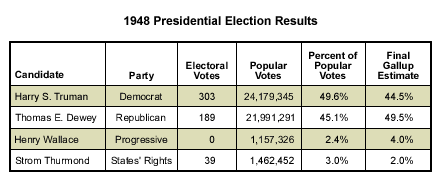
Social Mores
It's a telling indicator of social change over the past half-century that in 1948, the idea of the federal government legislating equal opportunities for all citizens was troubling to so many Americans. In February of that year, Truman proposed a broad civil rights program that would include legislation against lynching and using poll taxes to keep poor blacks from voting. Truman also proposed the desegregation of the armed forces and the establishment of a permanent Fair Employment Practices Commission.
A national Gallup Poll conducted in March 1948 gauged Americans' reactions to Truman's program. Most -- 63% -- said they had heard of it, but within that group there was deep ambivalence. A third (33%) said the whole program should be passed, while 31% said it should not, and 34% would not offer an opinion on the matter.
That level of uncertainty is consistent with the idea that for many people, the civil rights issue wasn't a simple question of whether blacks and whites should be treated equally. Especially in the South, many continued to view forced desegregation as federalism run amok -- Uncle Sam trying to dictate values that still differed widely between Northern and Southern states. The March poll found Americans were highly suspicious of federal involvement in enforcing civil rights; 47% believed that such matters were "not within the province of the government" and should be "left to the employer" or "not dictated." An additional 2% felt such matters should be left to the states.
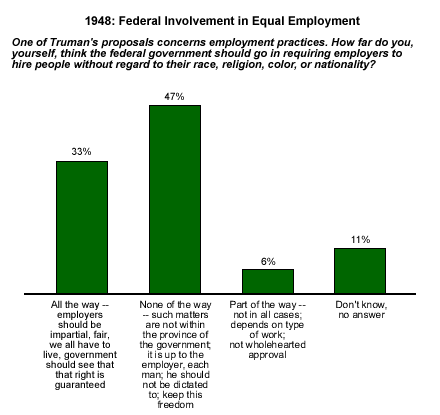
Even with regard to the most horrific civil rights violation, lynching, there was considerable sentiment that the federal government should stay out of it -- 41% of respondents said state governments should be left alone to deal with this issue (although a plurality, 46%, did think the federal government should have the right to get involved).
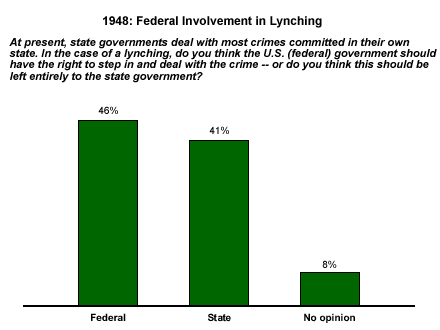
With regard to poll taxes, which in effect disproportionately kept poor blacks from voting, Americans expressed sentiment more favorable to blacks, with two-thirds saying such taxes should be abolished.
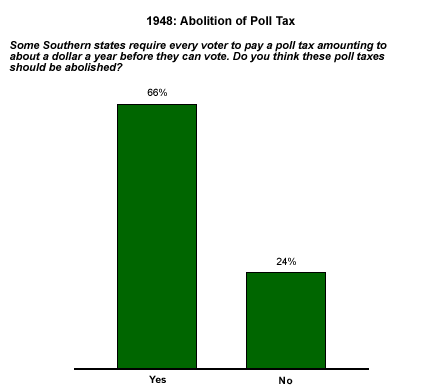
But the public was clearly not ready to accept the idea of desegregation of the armed forces -- 63% thought that black troops and white troops should remain separated, while 26% thought they should live and work together. This issue was especially sensitive, since the memory of hundreds of thousands of blacks serving in the armed forces during World War II was still fresh in Americans' collective consciousness.
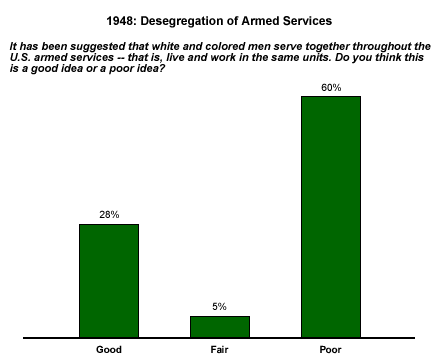
Key Points
The extent to which public sentiment in 1948 seems out of step with contemporary ideals sheds some light on why Lott's comments have generated such widespread indignation. Thurmond's 1948 campaign was possible only because public attitudes regarding civil rights 54 years ago were so different that they are largely irreconcilable with predominant modern values. Lott struck a chord by implying that the hard-won social change in the interim was not necessarily for the better.
